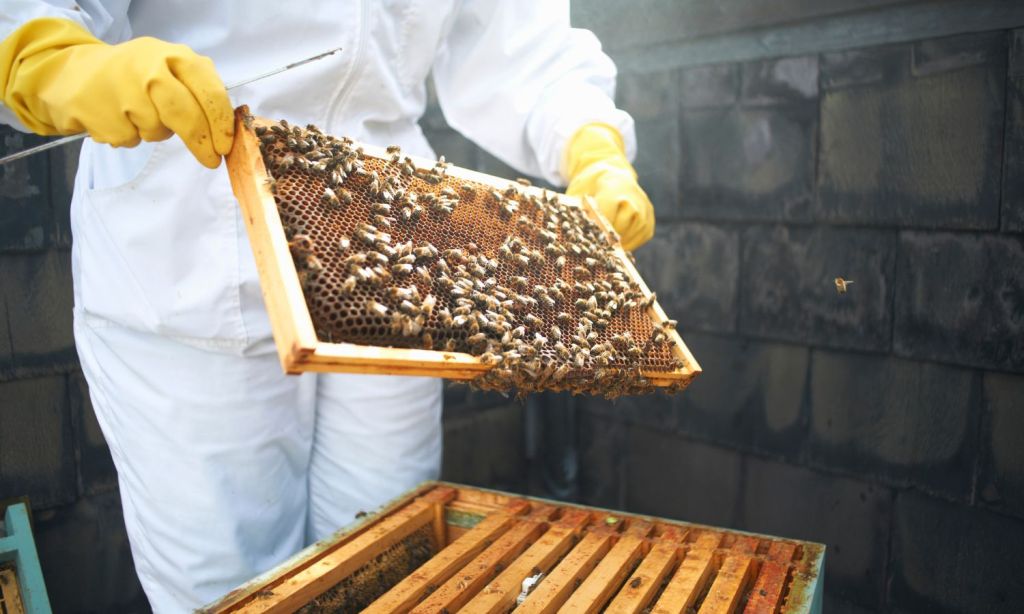I’m transfixed by the bees. They’re flying in and out of open slots on two carry-on-sized boxes made from salvaged wood. The boxes are on a gravel-lined landing, halfway up the Sheraton Hyde Park. They’re tiny but mighty.
I’m on a free tour offered by Sheraton Grand Sydney Hyde Park, learning about the 20,000 bees that call the boxes on the hotel landing home. Usually there are about 120,000 bees but given its winter there are only about 40,000.
With ‘sustainability’ a buzzword in the Australian travel industry for the past few years, many accommodations are jumping on the bandwagon, blowing smoke, but without taking action to benefit the planet.
But it’s not all greenwashing — many Australian hotels have launched impactful and innovative sustainability initiatives. Like Sheraton Grand Sydney Hyde Park’s bees.
Like any bee placed in an urban area where we had pushed them out, the bees in Sydney’s Hyde Park are re-pollinating the 80-square-kilometre radius around them. The hotel’s tours of its hives are to help people understand the role of bees in communities.
“When you introduce bees to any area, they bring in other species and that introduces other species,” says Renata Gilbert, co-founder of Rooftop Bees. The company has supplied bees to other spots in Sydney: Shangri-La, Qantas’ airport lounge and David Jones in the CBD.
The honey the bees make is used at the hotel’s breakfast buffet, taken to clients for the hotel’s sales meetings and will eventually be sold in pots by the hotel. Only 50% of the honey is taken from the hives and only twice a year.
“Perhaps the worst example of a hotel claiming sustainability was an ‘eco-lodge’ that claimed sustainability credentials, but had inadequate sewage treatment on the island,” says Lee Stewart, a sustainability professional with 20 years’ experience.
“Guests were only allowed to swim in certain places or at specific times due to the pollution, which was a stark contradiction to their eco-friendly claims. Not only do such practices mislead guests, but they can harm the environment and local communities, highlighting the need for genuine and comprehensive sustainability efforts.”
Hotels that greenwash get away with it mostly due to a lack of regulation, management training and consumer awareness, Stewart says. Many regions have insufficient regulations or enforcement mechanisms to address greenwashing, and the absence of consistent standards allows hotels to use vague terms or make misleading claims.
For example, ‘eco-friendly’ can mean many different things and is often used without specific criteria. The hotel may also unintentionally greenwash — they might not understand basic sustainability fundamentals and think they can call themselves eco-friendly if they recycle.
The properties part of the Australian hotel group Crystalbrook Collection are among the accommodations leading the way with clever sustainability initiatives. Crystalbrook Byron also has beehives, while Crystalbrook Kingsley provides the University of Newcastle with food waste for sustainability studies.
Guest room key cards are made with 100% recycled wood, and the hotel doesn’t use single-use plastic like straws and stirrers. A whopping 80% of the produce at the hotels’ restaurants is sourced within a three-hour drive of each hotel. And all dishes are labelled with ‘climate calories’, which details the ingredients’ journey to your plate.
Related: Sustainable Travel Is Achievable, But You Have to Do Your Research
Related: Some Like It Hot! Train Travel Is Trending and Aussies Are All Aboard
Read more stories from The Latch and subscribe to our email newsletter.







